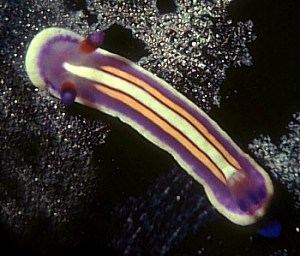
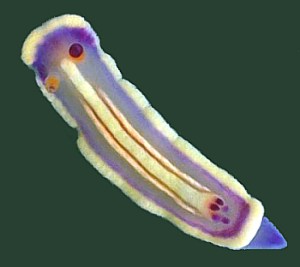
Durvilledoris lemniscata
(Quoy & Gaimard, 1832)
Order: NUDIBRANCHIA
Suborder: DORIDINA
Superfamily: EUDORIDOIDEA
Family: Chromodorididae
DISTRIBUTION
Tropical Indo-West Pacific
PHOTO
UPPER: Phuket,Thailand,18 Feb 1982, 6mm long preserved. PHOTO: H. Just.
LOWER: Suakin, Sudan, Red Sea, April 1980. 9mm long alive PHOTO: C. Todd.
The mantle is purple with a broad creamy yellow border. In the midline is a broad white band running from between the rhinophores back to the gill pocket which is also white. On each side of this median white band is a thin wine red line and then a yellowish band and then another thin red line, which run from just behind the rhinophores back to the gills. The rhinophore stalk is transparent colourless, the basal half of the rhinophore club is red or orange and the upper half shades of purple. The gills are similarly coloured with a basal white band, then orange-red then purple. The foot is a uniform purple. in a specimen from the Red Sea the colour pattern is less intense but the same pattern applies. Grows to about 10mm in length.
See the Noumea purpurea Colour Group Page to compare this species with others of similar colour.
References:
• Quoy, J.R. & Gaimard, J.P. (1832). Voyage de decouvertes de L'Astrolabe pendant les annees 1826-1827-1828-1829, sous le commandement de M.J. Dumont D'Urville, Zoologie, 2: 1-686.
• Rudman, W.B. (1984) The Chromodorididae (Opisthobranchia: Mollusca) of the Indo-West Pacific: a review of the genera. Zoological Journal of the Linnean Society 81: 115-273.
Rudman, W.B., 1999 (December 5) Durvilledoris lemniscata (Quoy & Gaimard, 1832). [In] Sea Slug Forum. Australian Museum, Sydney. Available from http://www.seaslugforum.net/find/durvlemn
Related messages
Durvilledoris lemniscata from Lau Islands, Fiji
October 9, 2007
From: Peter Middelfart
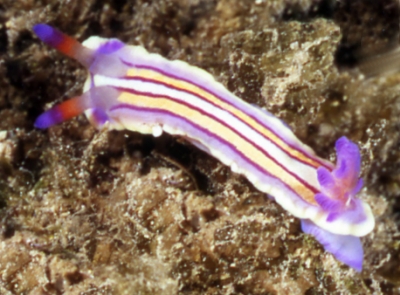
Hi Bill,
Here is the second species we can't figure out. It was found in the same place as the Hydatina? species we submitted [message #20901 ]. This species is around 2.5 cm long.
Locality: Toubou reef flat, 0-1 m, Fiji, Pacific, 17 August 2007, sandy inner reef flat. Length: 2.5 cm. Photographer: P. Middelfart.
Cheers,
Lisa and Peter
petermiddelfart@hotmail.com
Middelfart, P., 2007 (Oct 9) Durvilledoris lemniscata from Lau Islands, Fiji. [Message in] Sea Slug Forum. Australian Museum, Sydney. Available from http://www.seaslugforum.net/find/20902Dear Peter,
Like the Hydatina amplustre in your last message, this is another not very common species. It is Durvilledoris lemniscata, and as its colour suggests, it is a chromodorid
Best wishes,
Bill Rudman
Colour in Durvilledoris lemniscata from Reunion
June 19, 2007
From: Hugues Flodrops
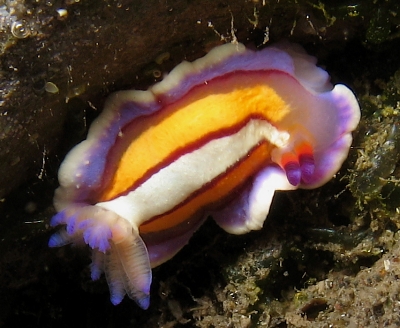
Concerning message #12978:
Dear Bill,
Here are two specimens from the same pool of Etang-Salé to illustrate the variation of this beautiful nudi, Durvilledoris lemniscata.
The first specimen has a pair of reddish-purple lines on each side of the broad median creamy white band. Size about 35 mm, depth 0,5 metre and date observed: 5 april 2007.
The second has only a faint trace of the second reddish-purple line; size about 30 mm, depth 0,5 metre and date observed 8 april 2007.
Locality: Etang-Salé, 0,5 metre, Reunion Island, Indian Ocean, 5 and 8 april 2007. Length: 35 mm and 30 mm. Photographer: Hugues Flodrops.
Long life to the forum.
Regards.
Hugues;
hugues.flodrops@wanadoo.fr
Flodrops, H., 2007 (Jun 19) Colour in Durvilledoris lemniscata from Reunion. [Message in] Sea Slug Forum. Australian Museum, Sydney. Available from http://www.seaslugforum.net/find/19987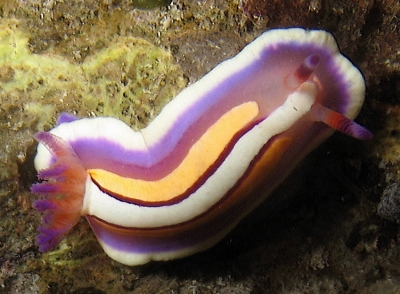
Thanks Hugues,
It is indeed a beautiful species. It also has a very special French connection, being first reported from Mauritius by the famous French naturalists, Quoy & Gaimard, who were on board Dumont D'Urville's Voyage of the Astrolabe between 1826-1829 - one of the first European voyages of discovery. More recently, I placed the species in a separate genus, which I named Durvilledoris, in recognition of the leader of that famous expedition
Best wishes,
Bill Rudman
Durvilledoris lemniscata from Reunion Island
February 18, 2005
From: Philibert Bidgrain
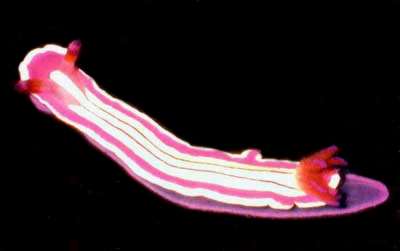
Reunion Island sea slugs.
We have only one specimen, of Durvilledoris lemniscata observed by Maurice Jay, size 12 mm, "Grand Fond lagoon" at Saint Gilles (Reunion Island) under a rock, 6 March 1985. Photographer: Maurice Jay
Best Regards
Philibert Bidgrain
http://vieoceane.free.fr/runseaslug/indexslug.htm
pbidgrain@yahoo.fr
Bidgrain, P., 2005 (Feb 18) Durvilledoris lemniscata from Reunion Island. [Message in] Sea Slug Forum. Australian Museum, Sydney. Available from http://www.seaslugforum.net/find/12978Thanks Philibert,
This does seem to be a very common species anywhere
Best wishes,
Bill Rudman
Durvilledoris lemniscata from northern NSW
March 17, 2004
From: Denis Riek
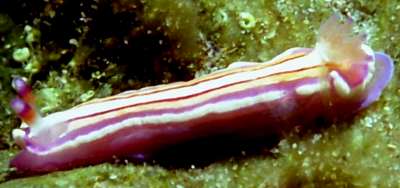
Dear Bill,
Hastings Point on the north coast of New South Wales [Australia] regularly provides some surprises and for me this Durvilledoris lemniscata was one. It was found crawling over algae in a rock pool at low tide in March 2002 and was 30mm in length. The contrast of this pink and purple animal against the green algae was obvious from yards away.It is the only one I've seen.
Cheers,
Denis Riek.
denisriek@hotmail.com
Riek, D., 2004 (Mar 17) Durvilledoris lemniscata from northern NSW. [Message in] Sea Slug Forum. Australian Museum, Sydney. Available from http://www.seaslugforum.net/find/12452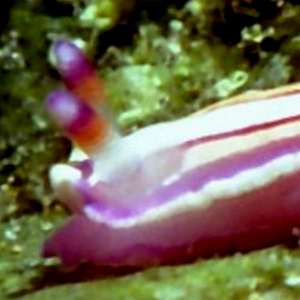
Dear Denis,
Durvilledoris lemniscata seems to be quite rare even in the tropics. We have very few records of it and I am sure, if it were more common, that its brilliant colours would make it a very photographed animal. This is a nice find
Best wishes
Bill Rudman
Hitchhiker Seaslug ID please!
March 13, 2003
From: Mok-Yi Chow
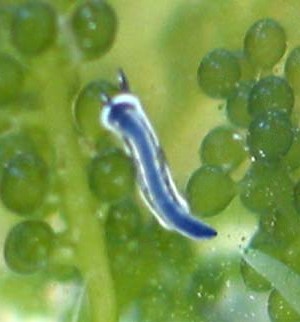
Hi!
This tiny sea slug came off my live rock as a hitchhiker. I never thought too much about him since I figured he'd probably perish after awhile... but 2 months later he is still alive and kicking, and actually got slightly bigger! I am wondering if you can help me ID him? I guess he is finding food in my aquarium.
Thanks!
Mok-Yi Chow
mychow@erols.com
Chow, M.Y., 2003 (Mar 13) Hitchhiker Seaslug ID please!. [Message in] Sea Slug Forum. Australian Museum, Sydney. Available from http://www.seaslugforum.net/find/8991Dear Mok-Yi,
It's a bit hard to identify these animals from underneath and with no idea where in the world they came from. However one possibility is the little chromodorid Durvilledoris lemniscata. These animals are specialised sponge feeders and so I wouldn't normally consider them as potential 'hitchhikers' if it weren't for Jim Roth's recent message. Perhaps they feed on a crevice-dwelling sponge, and because of their small size, only eat it fairly slowly.
Best wishes,
Bill Rudman
Durvilledoris lemniscata in aquarium
February 14, 2003
From: Jim Roth
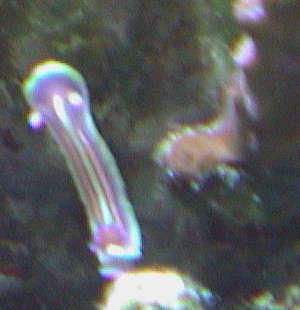
Hi Dr. Rudman,
Here is a nudibranch that was introduced accidentally into my aquarium. Sorry for the poor photos, you can see the features pretty well.
It's less than an inch long, has the purple-white-yellow pattern you see, the "bunny ears" antennas and a gill structure in the rear. The cool thing is it's been living in my reef tank for more than a year and it's grown, so it must be eating something. Can you ID it?
Thanks and Regards,
Jim Roth
rothj@optonline.net
Roth, J., 2003 (Feb 14) Durvilledoris lemniscata in aquarium. [Message in] Sea Slug Forum. Australian Museum, Sydney. Available from http://www.seaslugforum.net/find/9184Dear Jim,
Your animal is Durvilledoris lemniscata. I am very surprised it has lasted a year or more in your aquarium as it is a chromodorid nudibranch, and like all its relatives it feeds on particular sponges. apparently it must have hitched a ride on something, a rock perhaps, with its favourite sponge food. Either the sponge is particularly hardy and has found away to live in your aquarium, even while being constantly eaten by your nudibranch. Perhaps you should keep an eye on it and see if you can find what it is eating. If it has a 'home territory' in your aquarium that would be a good place to look.
Best wishes,
Bill Rudman
Durvilledoris lemniscata from the Phoenix Islands
October 23, 2002
From: Mary Jane Adams
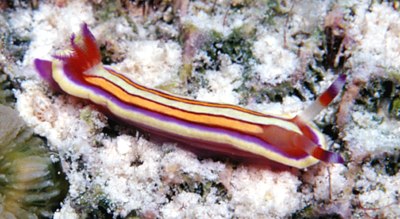
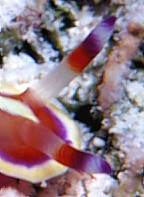
Hi Bill,
I found this beautiful Durvilledoris lemniscata crawling over dead doral at the base of a bommie inside the lagoon of Orona Island, Phoenix Group, Central Pacific. Stretched to the max, it was only
about 12mm long, but what a beauty! I love the rainbow-banded rhinophores.
Depth: 17 meters,
Date: July 2, 2002.
Best regards,
Mary Jane
divepng@yahoo.com
Adams M.J., 2002 (Oct 23) Durvilledoris lemniscata from the Phoenix Islands. [Message in] Sea Slug Forum. Australian Museum, Sydney. Available from http://www.seaslugforum.net/find/8247Thanks Mary Jane,
It is indeed a beautiful animal.
Bill Rudman
Re: Durvilledoris lemniscata in aquarium
September 27, 2002
From: Andy Angel
Thanks very much for your help Bill.
Andy
leelaura@aangel13.freeserve.co.uk
Angel, A., 2002 (Sep 27) Re: Durvilledoris lemniscata in aquarium. [Message in] Sea Slug Forum. Australian Museum, Sydney. Available from http://www.seaslugforum.net/find/8049Durvilledoris lemniscata in aquarium
September 26, 2002
From: Andy Angel
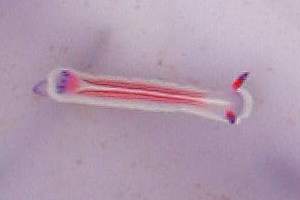
Hi again,
I've managed to get a picture of the slug i found, hope its good enough for an ID .Any info on it such as eating habits would be great.
Thanks for any help
Andy
leelaura@aangel13.freeserve.co.uk
Angel, A., 2002 (Sep 26) Durvilledoris lemniscata in aquarium. [Message in] Sea Slug Forum. Australian Museum, Sydney. Available from http://www.seaslugforum.net/find/8044Dear Andy,
Your photo is instantly recognisable as Durvilledoris lemniscata. Sorry I didn't have a clue from the sketch you sent earlier(and I didn't post on the Forum). I guess you got this in your aquarium from some 'live rock' you bought, which was presumably from somewhere in the Indian or Pacific oceans. Concerning its food. It is a member of the nudibranch family Chromodorididae, which feed exclusively on sponges, each species having its particular preferences. Unfortunately we don't know the food preference of most species, and that includes this species. Probably there was a small colony of its preferred sponge on your live rock or it is in a severe state of starvation. Your chance of finding a colony of the right sponge by luck are probably zero.
Best wishes,
Bill Rudman
Durvilledoris lemniscata from Heron Island
October 14, 2001
From: Julie Marshall
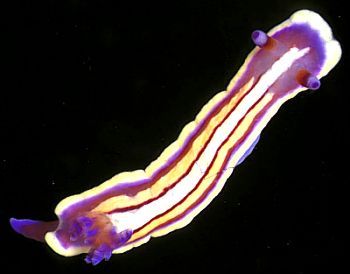
Dear Bill,
Here is an Australian specimen of Durvilledoris lemniscata, found at the reef crest at Heron Island [Great Barrier Reef] under a dead coral slab at low tide in April 1995. It was 15 mm in size so bigger than the other animals on your page.
Best wishes,
Julie Marshall
juliemarshall@netspace.net.au
Marshall, J., 2001 (Oct 14) Durvilledoris lemniscata from Heron Island. [Message in] Sea Slug Forum. Australian Museum, Sydney. Available from http://www.seaslugforum.net/find/5450Thanks Julie,
Bill Rudman.
Durvilledoris lemniscata. from French Polynesia
October 11, 2001
From: Daniel Geiger
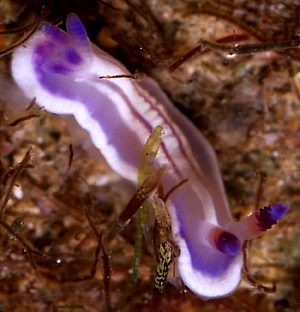
Hi Bill
Here is a new photo:
Chromodoris sp. French Polynesia, Moorea, August 2001, body approx. 5 mm.
Daniel
dgeiger@nhm.org
Geiger, D., 2001 (Oct 11) Durvilledoris lemniscata. from French Polynesia. [Message in] Sea Slug Forum. Australian Museum, Sydney. Available from http://www.seaslugforum.net/find/5432Thanks Daniel,
This little chromodorid is Durvilledoris lemniscata. I named the genus after Dumont d'Urville who was in command of the French research vessel the Astrolabe during its great voyage of scientific discovery in the early years of the 19th century. Quoy & Gaimard, the naturalists on board, discovered this beautiful species during the voyage. A very appropriate animal for you to find in French Polynesia.
Best wishes,
Bill Rudman
Durvilledoris lemniscata from Saudi Arabia
May 3, 2001
From: Gordon T. Smith
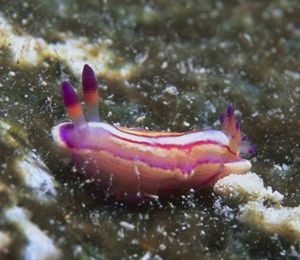
Dear Bill,
Here is another Hypselodoris? sp for ID. This one was tiny, 5 mm if that, found in the shallows. Apologies for the poor photo. Once again North Obhur, Jeddah, Saudi Arabia.
Regards
Gordon
aquashot@emirates.net.ae
Smith, G.T., 2001 (May 3) Durvilledoris lemniscata from Saudi Arabia. [Message in] Sea Slug Forum. Australian Museum, Sydney. Available from http://www.seaslugforum.net/find/3669Dear Gordon,
Not a bad photo for 5mm. It certainly has the elongate shape of a Hypselodoris but anatomical differences put it in arelated genus Durvilledoris. its name is Durvilledoris lemniscata. For something so small, it is quite spectacularly coloured.
Best wishes,
Bill Rudman
